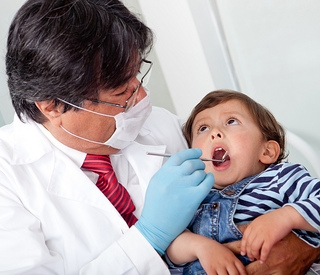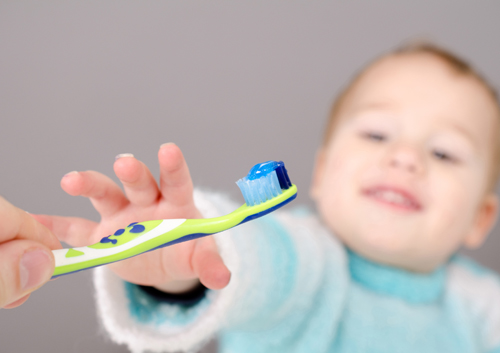
While you don’t have to wait to start eating right, March is the month the Academy of Nutrition and Dietetics asks everyone to pay special attention to what goes into our bodies. The Academy has designated the month of March for focusing the public’s awareness on what they eat.
What Not to Eat
The academy points out that the foods you eat have a direct effect on the health of your teeth and specifically on tooth decay. Bacteria rely on carbohydrates to thrive. That is why Dr. Iyer and our team at Dentistry 4 Kidz tell our patients to cut back on both candy and sweets. They consist of simple sugars that feed the bacteria in your mouth and enhance tooth decay.
It’s the hidden sugars that will cost you, though. Get in the habit of reading labels on food and looking for products with added sugar. This includes ingredients that end with the suffix “ose.” When it comes to nutrition, these foods offer little value beyond satisfying that sweet tooth.
What You Should Eat
Turn to foods that not only taste good but are good for your teeth too. Dairy products, for example, provide the body with nutritional items that support tooth enamel. Foods high in protein feature phosphorus, a nutrient critical to oral health.
You can’t really go wrong by adding color to your diet, either. Fruits and vegetables make for a colorful plate and a healthy meal. Use some caution with acidic fruits like oranges or even tomatoes, because the acid can erode tooth enamel. It is better to include these foods in a meal instead of eating them by themselves.
Remember, good nutrition is something you should worry about all year long, not just when celebrating National Nutrition Month. March just serves as a fun reminder that eating right is a proactive step in managing your dental health.
We encourage you to give us a call at our Wichita Falls, TX office to learn more!

First aid training is a must when you are a parent. You can put on a bandage with your eyes closed. Perhaps even apply butterfly tape to avoid stitches. What about a dental injury? Do you have a checklist in mind on what to do when a tooth is knocked out, broken, or displaced from impact? All of these situations happen often and should be in a parent’s emergency training regiment. Luckily Dr. Iyer and our team are here to be a resource for such an incident!
Children’s most common dental injury is chipping a front tooth. It is so common that it seems like a right of passage. Say, for example, a two year old trips and hits her front teeth on the tile floor. First, check to see if the teeth have been broken to the nerve. You can tell if you see layers and a pinkish center. Then, wiggle each tooth and make sure it is not loose. If the teeth feel firmly in place, that is a good sign. Even if they are a little loose, the teeth will tighten again with time. If she develops a severe temperature or bite sensitivity then you know treatment is needed, which may include a root canal. If there are minor symptoms that diminish with time, continued observation will be fine.
Knocking out a tooth is also common and requires more attention than observation alone. As soon as possible, locate the tooth, touch only the crown (not the root), and rinse any debris gently with milk or water. Place it back into the tooth socket as soon as possible. The American Association of Endodontists states a tooth has a high chance of survival and retention for life if it is re-implanted within five minutes or up to 60 minutes if soaking in milk or saline solution. Our team at Dentistry 4 Kidz know many parents are nervous about the thought of doing this alone, but not to worry, our team is here to help!
Here’s another dental emergency example: Your child takes an elbow to the mouth during a basketball game and severely displaces a tooth but does not knock it out. What to do? First, apply light pressure in an attempt to move it back into place. Be extremely careful not to use excessive force. Place a cold pack for swelling and contact our office as soon as possible.
A dental emergency can be frightening. It is often messy and painful. The best initial reaction is to remain calm, and remember that we are here to help! Contact us at our Wichita Falls, TX office if your child encounters a dental emergency.

You might think babies don’t need to brush their teeth, especially when they don’t have any. But by starting good habits like brushing when your child is young, you can lay the foundation for them to continue those good habits into adulthood.
When do I start?
The best time to start brushing your baby’s teeth is before he or she has any. Develop the habit of wiping your baby’s gums with a wet, soft washcloth or gauze every day. There is no need to use toothpaste, just wrap the gauze or cloth around your finger, moisten it with a little water, and gently rub it over the gums.
This helps your little one get used to brushing while it eliminates bacteria in the mouth that can harm emerging teeth. You don’t need to apply a lot of pressure or even take very long: just a quick, gentle rub over the gums will do it.
What do I use?
When your child’s teeth begin to come in, you will need to switch from a cloth to a baby toothbrush. Find one that has a grip big enough for your hand, but a head that is small enough to maneuver easily in your infant’s mouth.
You don’t need to use any toothpaste until your son or daughter is about a year old. Even then, though, you’ll want to use just a tiny amount: about the size of a grain of rice. When your toddler is about two years old, you can use a pea-sized amount.
By around six years of age, your child will probably rinse and spit without your help. At that point, you may want to introduce a child-friendly fluoride mouthwash.
How do I do it?
Your child probably won’t be able to brush his or her teeth alone until about the age of five or six. This means that you will need to do it. To brush your child’s teeth, gently use the brush over all the teeth and gums, even areas where the teeth have not come in yet.
As your child grows and becomes more independent, you can allow him or her to hold the toothbrush while you guide your child’s progress. Make sure you talk to your child while you are brushing, and explain why you brush: what you are doing and how you are doing it.
In addition to regular visits with Dr. Iyer, instilling good oral health habits in your child early on will ensure a lifetime of good dental health.

It’s common for children to suck their thumb at a young age. Dr. Iyer and our team want you to understand the potential issues that can surface down the road if the habit isn’t broken early on.
It’s normal for infants to explore the function of their mouths by putting objects like their thumbs inside it. You shouldn’t be concerned if your baby regularly sucks his or her thumb. For infants who are still growing their baby teeth, thumb sucking can help with stimulating growth and development of their baby teeth.
Thumb sucking is not a problem among infants because they generally do it to sooth and comfort themselves. Problems can occur of kids continue the habit when their baby teeth begin to fall out, around six years of age.
If you have a young child whose adult teeth are starting to come in, that’s when thumb sucking can start to be a problem. Most children stop thumb sucking between the ages of two and three years. According to the American Dental Association, if thumb sucking continues as adult teeth come in, this can lead to problems involving improper alignment of teeth and growth of the jaw, gums, and roof of the mouth.
It may also affect your child’s speech after that, by causing a lisp or other speech impediments. As a parent, you may need to begin to regulate and intervene if thumb sucking starts to become a bigger problem for your child.
How to Stop Thumb Sucking
Don’t forget that thumb sucking is a common habit that many children indulge in, and it should not be a concern right away. If you’re worried about your child’s thumb-sucking habit, start to address the issue as soon as possible.
The above techniques can help to reduce the amount of time your child sucks a thumb. Dr. Iyer and our team are here to help you if you have any questions or concerns about this habit.
Feel free to call our Wichita Falls, TX office and we will be happy to help you and your child.